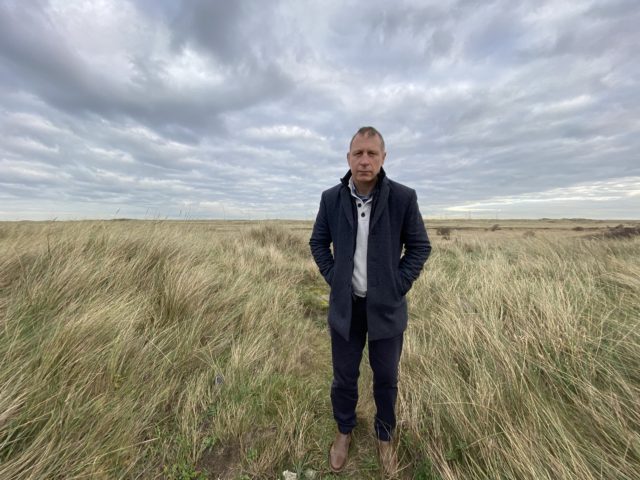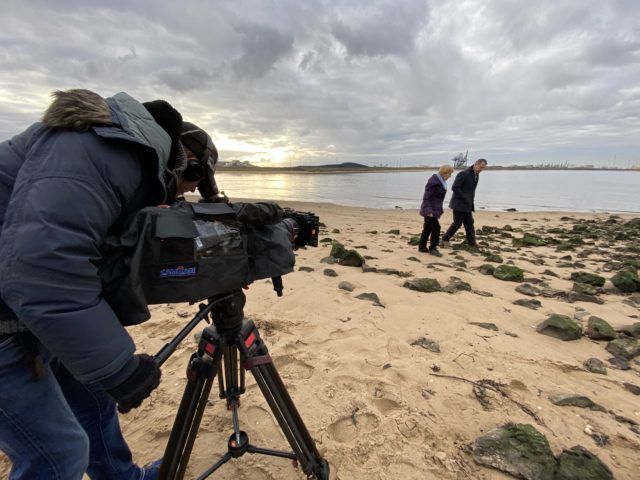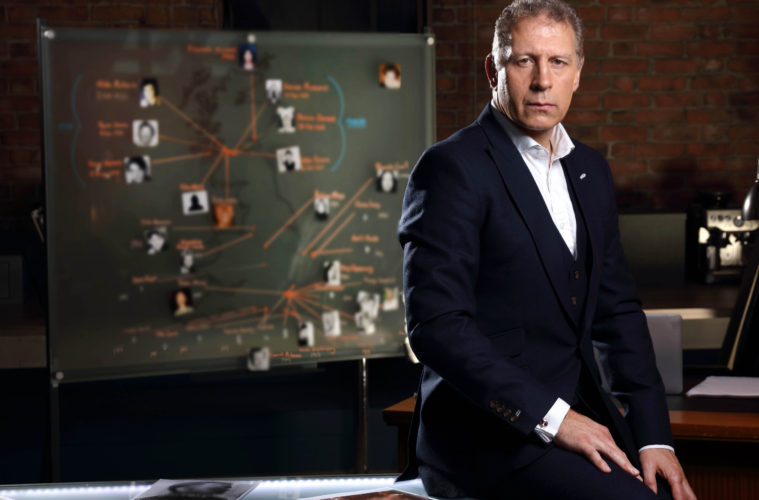Mark Williams-Thomas, known by many as ITV’s ‘the investigator’, has just released a new documentary titled Accused of Murdering Our Son: The Steven Clark Story. Upon meeting Mark Williams-Thomas, he is a man who prides himself on his hard-work and detailed research. With an extensive background in criminal investigations, as well as a history as a family liaison officer, Mark certainly has a multitude of stories to tell and is entirely knowledgeable in the crime genre. Following the release of his latest documentary, the investigator sat down with The Student Pocket Guide to discuss his career to date, his perspective as a former police officer, and his advice to young people seeking a career in investigative work…
In Conversation with Mark Williams-Thomas: ITV’s Investigator by Jessica Doran
I began my conversation with Mark Williams-Thomas by asking how his lockdown had been going – a basic question that has become the normality for everyone since the pandemic.
‘‘I mean first lockdown I had absolutely nothing and then September came and we started making the ITV Accused of Murdering Our Son and then another programme which we are in edit with at the moment which hasn’t been announced. Then I’ve just agreed to do another programme yesterday, a three part-er. So, yeah really busy which is good. I like being busy.’’
It is clear to see that Mark thrives in his documentary work, and he was quick to tell me he prefers his television work to his writing. Upon hearing this, I enquired about the societal impact that his television programmes might have on the public in comparison to his books.
‘‘Well, I think now there are such different platforms to appeal to different audiences. The younger generation very much like listening to audio books, they like listening to podcasts, they like watching things on YouTube and small little clips through social media. I think you’ve got to get that spectrum across and I think in terms of reading books, people will still enjoy reading them. That’s why when I did the book I made sure I did an audio book as well so that I would appeal to a wide audience. Crime is a huge genre and it appeals to so many people.’’
Mark Williams-Thomas has already covered a lot in his career; he is well known for his documentary that exposed Jimmy Savile as a child abuser in 2012 (The Other Side of Jimmy Savile). I had recently come across an interesting interview conducted by Emma Kenny with Mark, where he discussed his work on Jimmy Savile. Mark had suggested in this interview that by denouncing people like Savile, he hoped to implement fear within more celebrities or people in power who have committed similar crimes. Mark implied that he hoped it would in some way dismantle a hierarchy of power so that more criminals could be caught. I found this aspect intriguing, and I wanted to ask Mark whether he was ever worried about the repercussions on his own career when he aimed to take on such prominent names in the media.
‘‘Yeah, I mean I think it’s very clear that when you take on people that have some clout that you are going to ruffle some feathers. Whether that be through those individuals having a go at you, or whether it’s somebody associated with them. You know off the back of Jimmy Savile I got a petrol bomb and I got sent child abuse material. I have from time-to-time individuals who stalk me, individuals who are very abusive to me on social media. Off the back of the Savile work and the work I did to expose other sex offenders, the Mail On Sunday decided to have a go at me and wrote an article which was absolute rubbish. The press try to knock you off when you’ve become a bit successful, they’re very good at that.’’
Though Mark slightly laughed at the tabloids’ attempts to bring him down, like many personalities in the media, it seemed evident that he had faced his fair share of abuse from the press. I asked him whether this abuse had ever affected him on a level where he thought about reconsidering his career.
‘‘I’d be lying if I didn’t say that there are times where I’ve not thought in the past ‘‘why am I bothering to do this?’’ It’s about saying ‘‘you know what, I love what I do,’’ and (I’m being big headed) but I’m good at what I do. I think you get stronger in certain ways of being able to deal with it and being able to put things away.’’

Mark Williams-Thomas
Mark prides himself in the amount of detail that goes into his work. He has often talked about how well researched his cases are, so I questioned why it was so important to him that these cases are made known in detail to the public.
‘‘I want to know why and I want to know the detail of that. I have very high standards for myself but also for the people I work with. There’s no cutting corners. You do the job and you do it properly. It’s amazing what information I will find because previously people haven’t had the tenacity to go at it at the way that I do, but also I think that sometimes I look at things in a very different way that the mainstream police would look at it. My background is police and sometimes you have to look at it in a completely different way and use different techniques to try and get the answers.’’
This comment was particularly interesting to me, so I probed Mark a little further into how his investigative work differed from the work of the police.
‘‘One of the fundamental problems with the police is that they have to be very careful with evidence and with who they go and interview and speak to. I don’t have to comply with any policies, procedures, or rules; I can ask whatever questions I want. Sometimes they (the police) can be very limited in terms of where their line of questioning can go. I can use the power of the media to attract and get information and I think some police forces are very good at it but I think some are very terrible. The power of the media is absolutely the way to go. It’s the public that ultimately provide the information; it’s the police that put it together.’’
I wanted to talk about the power of the media that Mark touched on here. Having watched Mark’s 2016 documentary series, The Investigator: A British Crime Story, this is something he explores as he uses the power of the media to make unsolved cases known – he urges the police to reopen cases. However, though Mark might profess his own documentaries to be honest and well-researched, there is always an alternative argument when exploring such hate crimes in detail. I therefore wondered whether Mark was ever concerned that his documentaries could be sensationalising the murders of the victims he sought to explore.
‘‘No, because I think that’s the manner of which the documentaries are made. It’s very easy to make a documentary or a programme or an article and sensationalise either the crime or the offender, but I am very careful when I do my programmes. They are very victim focused and very much focused about the evidence. I follow the evidence where it goes not where I think it should go. I produce all my programmes so I craft them as well and I think one of the comments that came out of the Royal Television Society judges when they gave us the award for Jimmy Savile was that the programme was ‘sensational without being sensationalistic’, and I think that says it all really, it was. It gathered the evidence and put it into the public domain for the public to make their mind up. There are television programmes out there which have covered cases but they’re so opinionated and they’re so unbalanced because you’ve only got one side of the story and it’s really important to give that balance to allow the public to make their mind up. If the evidence is overwhelming (as it was in the Savile case) then the public will come down on the right side.’’
Having touched upon the Savile documentary a few times now, I assumed this might be Mark’s proudest piece of work, but I was mistaken.
‘‘I think it was a big piece of work but I wouldn’t say it was my proudest piece of work. I’m proud of every piece of work that I do because I invest in it massively. I think the difference with the Jimmy Savile case is the impact that it had afterwards. There is no doubt that had Savile not been exposed, we wouldn’t be in the position with Epstein and Weinstein.’’

Mark Williams-Thomas on the set of Accused of Murdering Our Son: The Steven Clark Story
As anyone can imagine, as an investigator, Mark becomes very heavily involved in the families of the victims he is researching. This is an enormous responsibility to take on, and so I wanted to discuss whether the families were mostly pleased with the work Mark was doing.
‘‘Overwhelmingly. I mean occasionally there are families who have different views but that’s very rare. I’d say probably 99% of the time my programmes are very well received by the families and I’ve massively helped them. My relationship with the families continues for many years after. The great thing is that I’ve been on the other side of the fence so I know exactly how the police work so I know exactly how to look after people. My role as a family liaison officer has really helped me in understanding that. I know exactly how the police process works but I am also able to guide them through the media element of it.’’
When Mark brought up his inside knowledge as a police officer, I thought it an appropriate time to discuss the recent events in the news that had concerned police misconduct. In light of the tragic murder of Sarah Everard, The Guardian recently released a statistic which said that while 594 complaints of sexual misconduct had been made against Metropolitan Police officers between 2012 and 2018, only 119 cases had been upheld. It was then suggested that the Metropolitan Police force’s actions towards the vigil for Sarah Everard thus highlighted police misconduct. Furthermore, as a former police officer, and someone who has built a career in investigating sexual assault crimes (and killings) I wondered what Mark’s opinion was on how the police should be working to prevent these crimes towards women.
‘‘Policing has changed massively since the 70s, 80s, and 90s. It has been constantly evolving in terms of how to deal with child abuse and how to deal with adult sexual abuse. It is a constant learning curve and the police always strive to be better. The Metropolitan Police probably come into the greatest criticism because they are the largest police force in the country. I think with the Sarah Everard case, in terms of dealing with the demos, I think it was a really delicate and difficult decision to make because on one level the people wanted to protest and hold a vigil and I get that, but that was during lockdown and in order to allow that to happen, the lockdown rules would have been broken. What of course then happened was that it was hijacked by individuals who didn’t have a cause for Sarah Everard and wanted to cause problems.’’
With Mark’s views on supporting the police’s actions to protect lockdown, I wanted to present the alternative argument for those who felt that they had been treated unfairly. During this time, images began to circulate on social media which showed how other group events across the UK (namely a football crowd in Glasgow) had been treated with more leniency during this period, and to which supported women’s feelings that they had been confronted with misconduct by police officers at the vigil, which was intended to be a peaceful protest. I therefore asked Mark what he would say to the men and women who feel betrayed by the system at this time.
‘‘There are people who are betrayed by the system I have absolutely no doubt about that. I deal with characters of injustice all the time, but violence isn’t a solution. In order to get your message across the best arguments are the ones where you keep calm and put your point across.’’
Referring to our earlier discussion about challenging those in power, I was eager to know whether Mark Williams-Thomas would ever do an investigation into police misconduct.
‘‘Absolutely and I have done. The detective podcast that I’ve got shows that I believe Special Branch planted evidence. Yeah. No problem at all. The police make mistakes; they have rotten people that need to be exposed.’’
Mark’s latest documentary Accused of Murdering Our Son: The Steven Clark Story was released on the 22nd April. It is an hour-long documentary investigating the unsolved murder of Steven Clark.
‘‘We show warts and all what it’s like under investigation. We take people through an hour’s journey of the police investigation and the impact on the family. You see some incredibly moving footage and you also see some real detail around their account and the stories they’ve given and I asked them some very difficult questions and they did very well in responding to that. Ultimately, I think it’s up to the public to decide whether the family have anything to do with Steven’s disappearance. There is still no clue as to where he is and it is quite a mystery. It was filmed very differently to how I film normally so it was filmed kind of like a fly on the wall drama/reality. We got footage of people who were in the moment. The family are very clear that they didn’t have anything to do with Steven’s disappearance and I believe them.’’
Mark speaks very passionately about his work and says the thing he values most in his role is his integrity. Considering this, I asked Mark what message he would like people to take from his documentaries.
‘‘Learn and benefit from them and if you’ve got any more information then pass that on – that’s really important because they’re serving a purpose. Anyone who wants to get into this space, know it isn’t easy. It’s hard work. I want to use my power to shine the light in the darkest of corners and give those people who have been failed in whatever way by the justice system some justice.’’
I thought this an appropriate time to conclude our interview, but before I did, I wanted to ask Mark if he could leave our readers with some advice to give young people who aspire to go into investigative work or make crime documentaries.
‘‘Put yourself out there. Go and make yourself available to people and go and find interesting cases to cover. If you’re a filmmaker go and shoot some scenes and create/craft a programme. Learn from other people. If you’re into writing then get out there and start doing some research around crime cases and find out some information that they don’t have. Craft it in a way so that the reader or the viewer feels engaged, so they’re learning at the same time you’re learning the information.’’
You can watch Mark Williams-Thomas’ new documentary now on the ITV Hub.
In Conversation with Mark Williams-Thomas: ITV’s Investigator by Jessica Doran.




